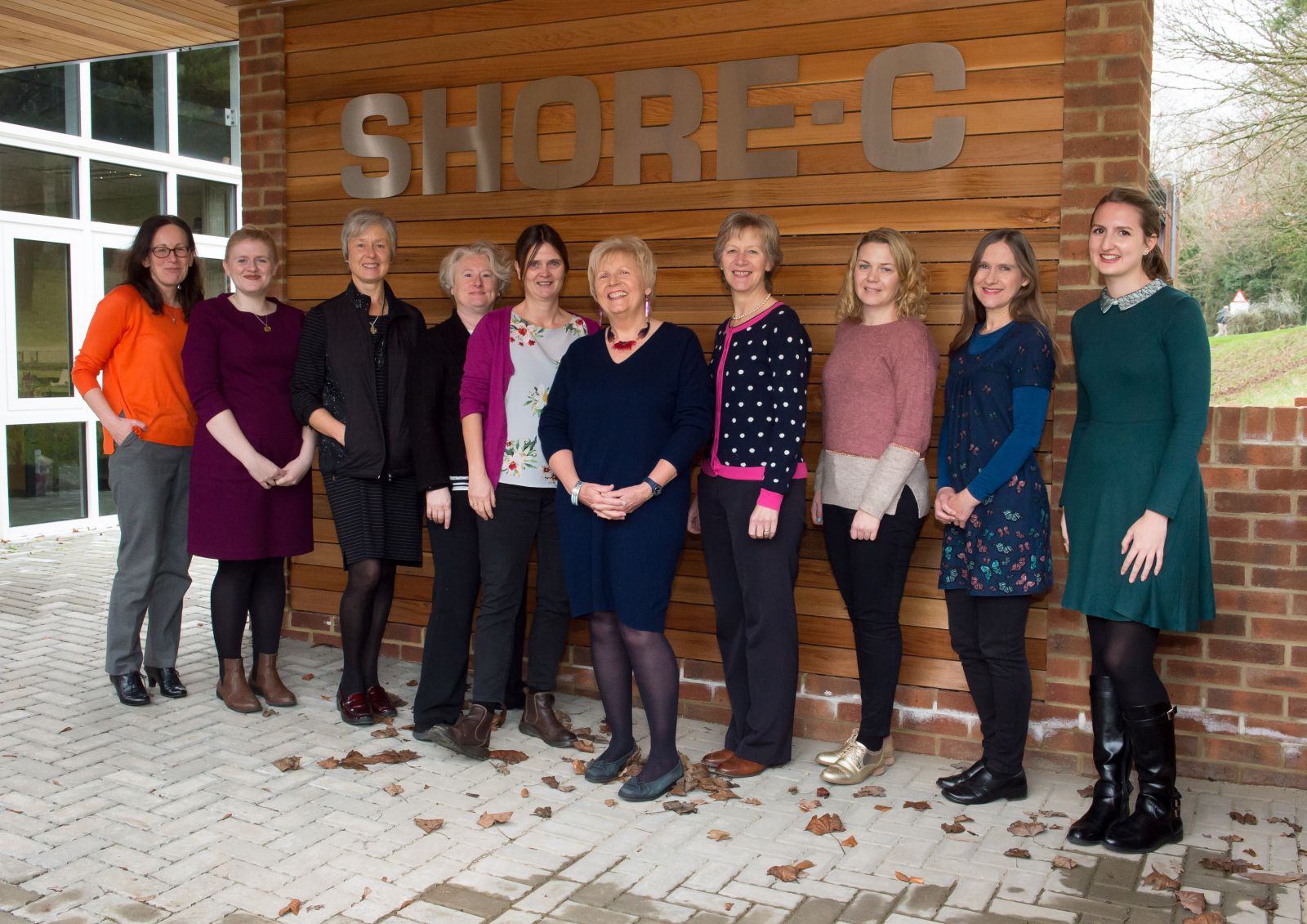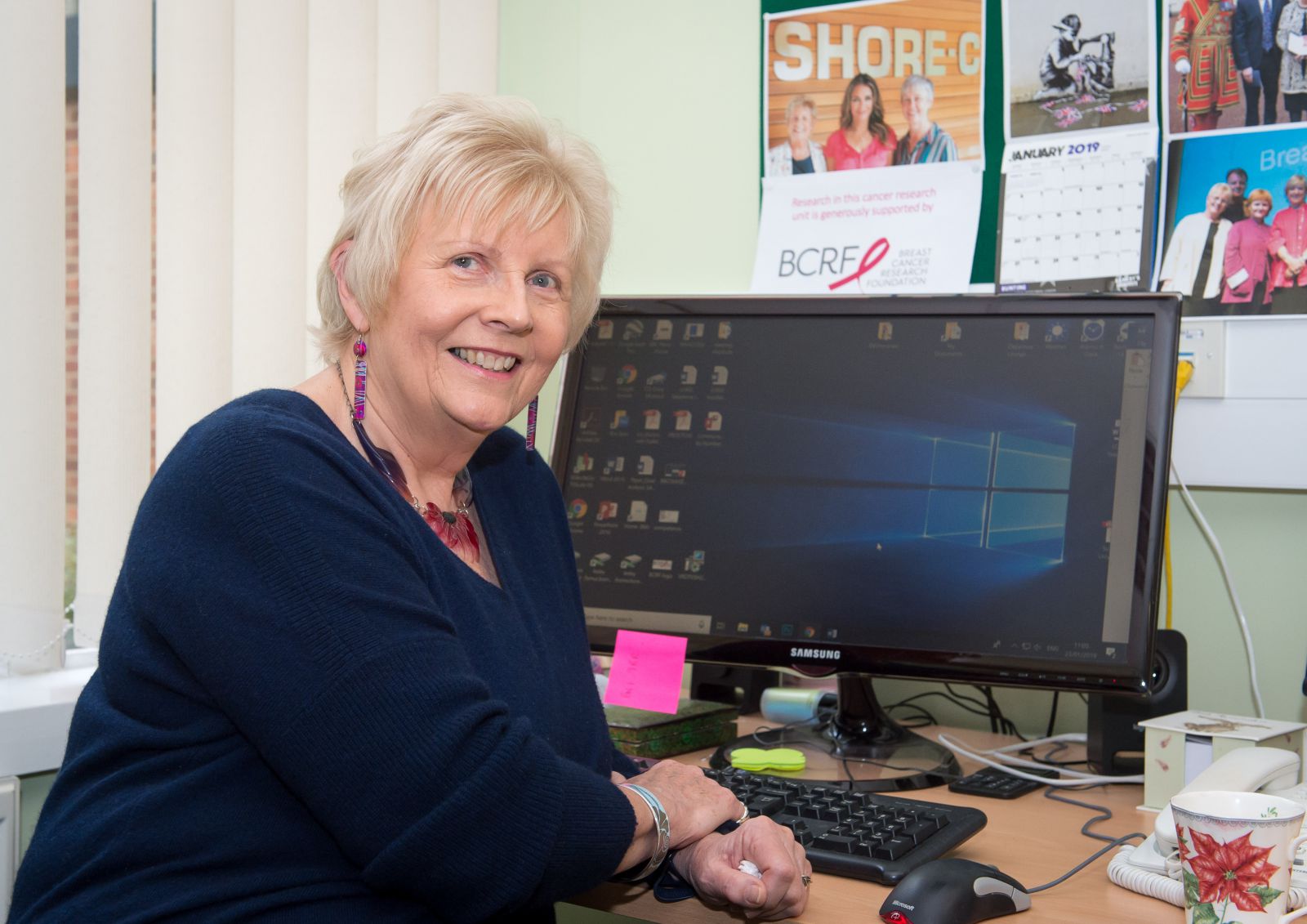Cancer care – making it better
Traditionally, diagnosis and treatment of cancer has been shaped by scientists and clinicians, but at what cost to patients and their families? Professor of Psycho-oncology Dame Lesley Fallowfield is putting patients at the heart of decision-making, helping health professionals work with them to make informed choices about treatments and their quality of life.
Ensuring that people aren't fatigued, depressed or feeling sick shouldn't be a luxurious add-on – it should be part of good cancer care.”
Psycho-oncology: Psycho-what?
When Professor Lesley Fallowfield was awarded a DBE by the Queen in 2016, she became a Dame Commander of the Order of the British Empire for services to psycho-oncology. As she gave Lesley Fallowfield the award, Her Majesty mused, “What you do sounds a bit sinister. What exactly is the ‘psycho’ part of oncology?” It’s a question Lesley hears often, and one that she and her colleagues at SHORE-C (Sussex Health Outcomes Research and Education in Cancer) are dedicated to exploring in order to improve cancer care.
Psycho-oncology is research that combines the behavioural, psychological, social and emotional with the physical aspects of cancer and explores how together these impact patients, their families and the health professionals who diagnose, treat and support them. It covers all stages of the disease, from prevention right through to end of life considerations.
“For too long,” Dame Lesley says, “the way benefits or effectiveness of cancer treatments were measured was slanted towards clinicians’ and scientists’ views of how different drugs or surgery might affect the cancer, forgetting that all cancers inhabit people. I wanted to put patients at the centre of the way treatment decisions are made.”
The start of a new approach to cancer care
Having completed a BSc in Experimental Psychology at Sussex in 1981, Dame Lesley embarked on a DPhil, looking into visual disturbances in neurological disorders. But the traumatic experience of a close friend with cancer became the catalyst that set her on a very different path.
Her friend had acute myeloid leukaemia, a type of blood cancer. “She was given one of the early bone marrow transplants,” remembers Dame Lesley, “but experienced horrible side effects and died very miserably. When she was dying, she asked me, ‘Why does the medical profession do this kind of thing to you without really telling you what the consequences might be?’ I promised her then that I would start to make things better for patients with cancer. I didn’t want anyone to have to witness their loved ones dying in the way my friend did.”
Changes in approaches to cancer had begun to emerge in the 1970s, with some studies looking at the types of anxiety and depression experienced by cancer patients, but it wasn’t until the 1980s that psycho-oncology really began to gain traction as a subspecialty of oncology.
The work of breast cancer surgeon Professor Michael Baum particularly stood out for Dame Lesley. He thought the psychological aspects of breast cancer were poorly understood and was interested in psychosocial aspects of care, specifically measuring quality of life and improving communication skills.
In fact, Michael Baum’s ideas had such a profound influence on Dame Lesley, that she went to work with him at King’s College London, determined to improve the experience of cancer patients after her promise to her friend.
In 2001, Dame Lesley came back to Sussex as the Director of SHORE-C. The research centre’s work is multi-layered. It measures the impact that a cancer diagnosis, its treatment and side effects have on patients’ lives; development of psychosocial interventions to help patients cope with these; and improving the ways in which health professionals communicate, to ensure that patients have better information to enable more educated decision-making about treatment options.
9.6 Million
Estimated number of deaths globally from cancer
World Health Organisation
–
1 in 2
People in the UK will get cancer in their lifetime
Cancer Research UK
–
Quality of life – measuring the immeasurable
One research challenge is that the many side effects of cancer therapies are under-recognised and therefore under-treated. Dame Lesley’s team has developed patient-reported outcome measures to determine symptoms and side effects via quality-of-life questionnaires.
“We’re not just looking at the psychological consequences associated with different treatments but the treatment-related harms that affect people profoundly,” she explains. “If the extra weeks of life gained from a new treatment are spent in hospital or confined to your house or bed because of overwhelming problems like fatigue, vomiting or chronic diarrhoea, what have you actually gained?
“It’s important to remember that, although quality-of-life broadly covers physical, emotional, psychological and social wellbeing, in practice that will mean very different things for different patients,” she adds. “For a young person who has had an entirely curable cancer, it might mean, ‘Can I still do my job after treatment, go travelling, go on to have children?’ For an older person, maybe in the last phase of their life, it might be a question of, ‘Will I be able to see my grandchildren or enjoy a meal with friends and family?’ You can’t just measure a few standard things. You have to tailor your questions so that they’re appropriate for the patient’s age, stage and lifestyle.
My team has developed ways to assess what many thought was immeasurable, so that doctors can present more even-handed information about treatment, and patients can weigh up what’s right for them,” explains Dame Lesley. “I think we’ve increased recognition of the importance of involving patients in evaluating the harms and benefits of treatment enormously."
My team has developed ways to assess what many thought was immeasurable, so that doctors can present more even-handed information about treatment, and patients can weight up what's right for them.”
Getting health professionals on board
If a patient is going to make wise decisions about the treatment options available to them, or follow the recommendations they’re given about diet or how to take medication, health professionals need to understand the importance of getting communication with them right. The challenge for those who work in this highly complex field, with its own specialist terminology, is to consider the very different levels of knowledge that patients may have. Coupled with an often-extreme degree of fear and worry about their diagnosis, this can have a huge impact on what someone actually takes away from a consultation with their doctor, as opposed to what the doctor thinks they’ve communicated.
Dame Lesley is particularly focused on improving the postgraduate communications skills training of senior doctors and nurses in the UK and abroad. “There’s no point in just targeting young medical students if they then enter a culture that fails its patients further along the line. If we’re really going to change things, we need top-down education, not just bottom-up.
“We’ve had to be quite canny,” she reflects, “explaining to senior health professionals how acquiring better communication skills will enhance their own job satisfaction and wellbeing, as well as benefiting the patient.”
The team has also tackled potential resistance from more senior individuals by running courses to help them teach junior colleagues. That way, they are learning together and issues of professional pride are reduced.
From training courses and workshops to commissions to produce DVDs and web-based materials around certain topics, such as how to talk to patients who have advanced cancer, SHORE-C’s work is in huge demand.
“Our evidence-based communication skills training is being rolled out on a global scale,” says Dame Lesley. “It’s encouraging to know that our work is reaching so far and helping to improve life for people with cancer around the world.”
The team has also produced user-friendly information to give to patients contemplating entry into a clinical trial (where a new therapy is being tested). “We’ve produced DVDs for patients to take home to discuss with family and friends. We want them to be able to play the DVDs over and over again so that they are really sure about what’s involved and know which questions to ask when they next see their doctor.”
And the work doesn’t stop there. Recently, responding to the particular challenges and disruption that the Covid-19 pandemic has brought for cancer patients, Dame Lesley has been presenting a variety of podcasts to help patients manage their stress and anxiety. SHORE-C’s web pages also offer yoga videos and exercise apps. It’s all part of keeping patients at the centre of what they do.
“In time,” concludes Dame Lesley, “I’d like to see every cancer centre providing upfront, tailored, supportive care alongside treatment. Ensuring that people aren’t fatigued, depressed or feeling sick shouldn’t be a luxurious add-on – it should be part of good cancer care.”

SHORE-C’s work is made possible by research grant income and charitable donations. If you are interested in supporting transformational cancer research at Sussex, please contact Robert.Yates@sussex.ac.uk
SHORE-C – a three-pronged approach
Current research is focused on bladder, prostate and breast cancer, but the Centre’s aim is to improve patients’ experiences of all types of cancer, via three different routes:
–
National and international clinical cancer treatment trials
including development of reliable, validated patient-reported outcome measures and the coordination of the psychosocial/quality-of-life sub-studies within the trials.
–
Supportive interventions
development and evaluation of interventions to improve side effects and the impact of a cancer diagnosis and its treatment on patients and their families.
–
Communication skills training
via a well-established, evidence-based suite of programmes and materials that are used worldwide and have been shown to enhance the professional effectiveness and personal satisfaction of healthcare professionals. This in turn improves interactions with patients and healthcare professional colleagues, patients’ understanding of their diagnoses, management plans and clinical trial recruitment.
Cancer research at Sussex
Research at Sussex is tackling cancer on many fronts, from the epidemiology and the genetic basis of cancers to the diagnosis and imaging of disease, new cancer chemotherapeutic agents, and public health aspects, such as improving cancer awareness.
For more information please visit the SHORE-C webpages, the Brighton and Sussex Medical School Oncology pages, and the Brighton and Sussex Cancer Research Network.

